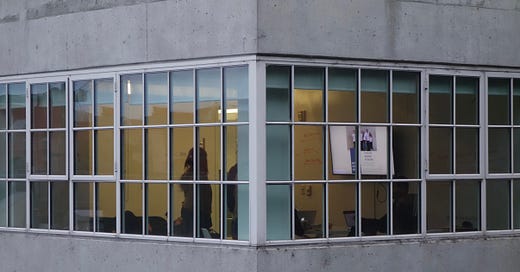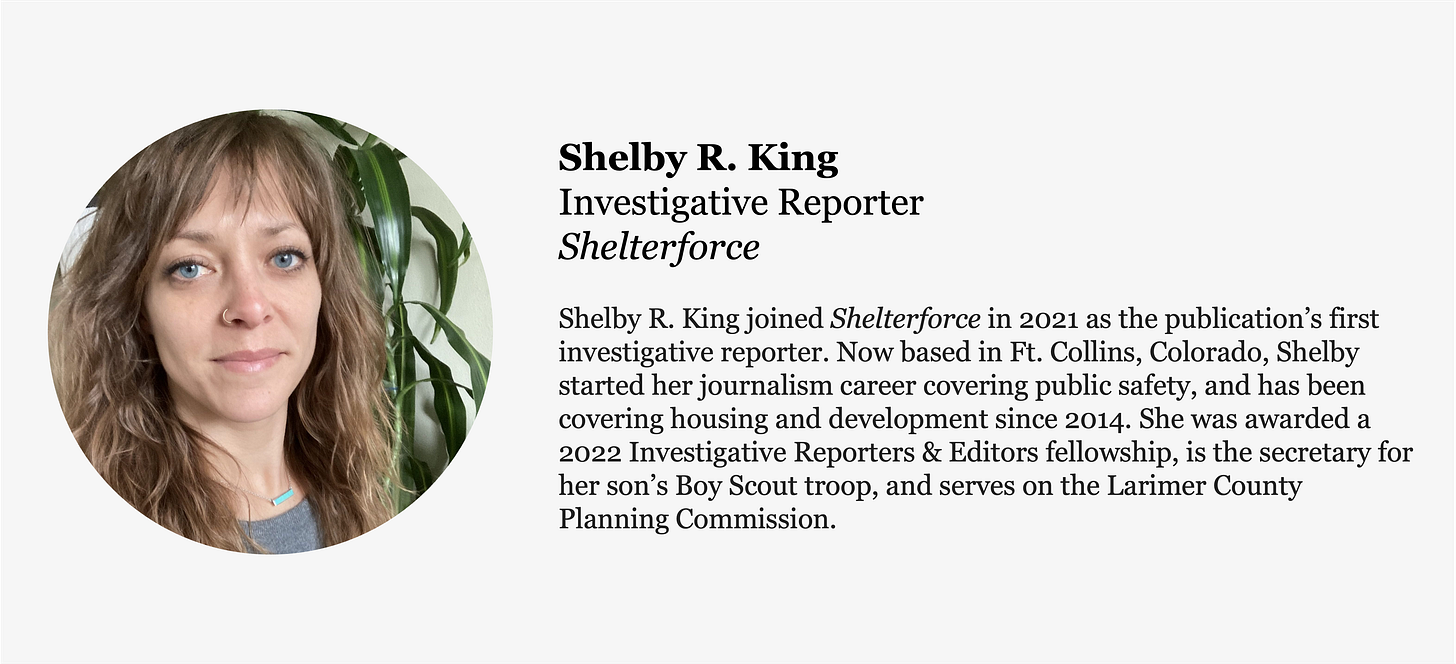About This Episode
In today’s episode, we feature one of the most important sectors in housing, housing journalism. I think it’s safe to say that most people, even semi-grizzled academics turned housing professors like yours truly, get most of their news about what’s happening in housing through journalists. Many of us are also sources for journalists or work for organizations with communications teams trying to influence what gets written and recorded. There has also been a noticeable uptick in the quantity of housing journalism as more media outlets add housing coverage in the growing face of a housing crisis and what I like to believe is a growing interest in all things housing.
So what does this mean for housing journalists and for those of us who rely on journalists to make our housing ideas, ideas, and campaigns public? Today’s conversation is with Editor-in-Chief, Miriam Axel-Lute and Investigative Reporter, Shelby King from Shelterforce, a publication that I love, a place I’ve been honored to publish, and a site that’s been holding it down in housing long before it became popular.
Join me for a conversation on how they became housing journalists, on the state of the field, and how housing journalism needs to take housing reporting to the next level.
This Episode’s Guest
Interview Transcript
Alex Schafran: Welcome, Shelby King and Miriam Axel-Lute, to another episode of Housing After Dark. It's wonderful to have you.
I'm really excited to have both Shelby and Miriam here, who are part of the Shelterforce publication that's near and dear to my heart. It was one of the ways I started to learn about the field when I was a young housing organizer.
I remember when Jake Wegmann, Deirdre Pfeiffer and I published a small piece on some of our tenure work in Shelterforce. It made me feel like I was communicating with people on the ground who are doing work in housing for the first time.
Excited to learn about the history of Shelterforce, how you became housing journalists, dig into the state of housing journalism and where housing journalism needs to go, and where Shelterforce is going.
Miriam, can you give us an understanding of how Shelterforce became the only independent, non-academic publication in the United States focused exclusively on community development, housing and related issues?
Miriam Axel-Lute: Shelterforce has been around for a long time. In 1975, there were some tenant organizers and legal aid lawyers in New Jersey who wanted to communicate with other tenant organizers around the country, find out what they were doing, how they were faring in similar fights, share strategies and talk policy. Its origins are very grassroots, very connected to practitioners.
Over the years, many of those folks moved into developing affordable housing, community development, community planning and things alongside tenant organizing. The publication just grew along with them to encompass all of those ideas.
Alex Schafran: One of the things I've always loved about Shelterforce is that it's a place where you have professional journalists writing about housing, who've learned about housing, and you have professional housers that have learned how to write to be able to share their ideas, and you have folks in between. Miriam, what was your path to becoming a housing journalist?
Miriam Axel-Lute: My story is unconventional. I came to housing from my interest in environmentalism. I was an environmental studies and biochemistry major in college. I had a seminar on the American city in the ‘90s, when people were starting to talk about urban sprawl. There was a very strong cohort within the environmental studies program that was trying to push for more coverage of environmental justice. We used to joke that we spent a lot of time sitting in the back row raising our hands and saying, “But that doesn't affect everyone equally” to try to bring justice and inequality into the conversation and counter the anti-urbanism that was fairly rampant at the time.
I interned at Shelterforce in the middle of college. That was my introduction to [the] publication and journalism. I was a writer but I didn't do journalism. I wasn't at a college or high school paper. The first article I wrote for Shelterforce was about squatters being evicted on the Lower East Side to make way for an affordable housing development, which was quite a tension. I think in my first interview with a public official, I got the quote, “We're not evicting them, we're just removing them involuntarily.”
I caught the bug. I loved being able to talk to people, tell these stories and weave together what was going on. When I left college, I came back to Shelterforce. It felt like a good place to combine my interests. I was there for several years, I started as the administrative assistant and I left having spent a stint as the interim ED.
When I left I thought I wanted to go back to school for planning. But I discovered that I was already immersed enough in these topics. I spent some time as just a regular old journalist, the news editor of the alt-weekly paper here in Albany, New York. When I was the news editor, we covered a lot of planning, housing and justice topics at Metroland. I freelanced for a while before coming back to Shelterforce.
Having spent time in the journalism world, I brought an interest in having more professional journalists join. Up until this point, Shelterforce had largely been practitioner-written. Though I got the benefit of doing some real reporting, and being edited while I was there, it had primarily been written by people in the field. It’s still a core of what we do; we have more of that than most publications. But I started to introduce more in-house writing, and working with existing journalists. I've been growing that over the past 13 years that I've been here.
Alex Schafran: Speaking of professional journalists, I'm excited to bring one on, unlike most of the guests here on Housing After Dark, who didn’t spend their formative housing experiencing gaining years in New York City. Correct, Shelby? That's just in case people think that every Housing After Dark episode learned in the crucible of New York City housing politics, it's only mostly true.
Shelby King, tell us your story. How did you go from journalism to housing?
Shelby King: I started as a general news reporter at small town newspapers in Oregon back in 2009. I pretty quickly moved into cops reporting kind of by fluke but also because part of why I wanted to write as a professional journalist is because I like telling stories for people who don't have voices.
I was there for about six years. I decided that it was a little trauma heavy for what I was looking for and it was just time for me to find a new beat. I applied for a few different places and had a couple of offers. The place I chose was a housing reporting b2b journal in Portland, called the Daily Journal of Commerce. I kind of just chose it on a fluke, my other two options were either a local newspaper in a place I had already lived in and didn't want to go back to, or I was trying for a radio job.
At the Daily Journal of Commerce, they covered the development and construction industry in Portland in 2013/14. Rising housing prices were just starting to get rolling in Portland and the recession was on its way out. Construction and development were ramping up, people were making money again and I was reporting for folks that were like, “Build, build, you can charge however much you want. People are gonna move here. You can make a lot in rent.” I was living an hour out in this moldy little apartment in Hillsboro because everything was too expensive for me to afford on the 35 grand I was making a year as a beat reporter at this tiny newspaper.
After a few months of writing these stories that were making me kind of sick to my stomach, I found out that our local alt weekly called [The] Mercury in Portland, was hiring a general news reporter. I pitched to them that we needed a housing reporter in the city because at that point, I don't think that the Oregonian was really covering housing. The [Portland] Tribune was looking at housing every once in a while. There were entire complexes being evicted so that they could do a little revamp and then jack up rents and nobody was really reporting on it. I got hired as a general reporter, but my focus was always on housing. I was one of the first folks in Portland to really start pumping out housing related stories.
Alex Schafran: One of the challenges a lot of housing professionals have, is if you've worked in housing as a professional, you've had some sort of traumatic experience in the housing industry because it's a fucked up place. But that doesn't compare to the day-to-day traumas that most humans in America have with their own housing experiences. The fact that you center that in your own change from reporting on cops to reporting on something that is personal is so critical. I think it's something that is driving a lot of the activists and professionals that I start to meet, especially the younger generation who see their own experience in this way.
Shelby King: I didn’t even have it all that bad. I look white. I have a college education. I don’t have a criminal record. It was striking to me how hard it was and how good I had it still.
Alex Schafran: This is a period where Portland was never cheap, but not as crazy as it is now.
Shelby King: It was in 2014. It was before it really started getting going the way it is now. They have passed a lot of laws in Portland because of the activism that started around that time. We got just cause eviction changed and rent reimbursement and things like that. It started because of the reporting that was going on. One of the first people that I reported on was an owner of a bookstore. She had a developmentally disabled son who needed intensive care. She was getting priced out, became an activist and got herself elected to City Council.
Alex Schafran: I want to talk about the current state of housing journalism. One of the motivating factors of having you both on is that it does feel there has been a pretty significant uptick in the quantity of housing journalism. I also would say, in many cases, the quality and diversity of the types of people who are writing. My friends at the KQED Housing Desk, which was created over the last few years. Cal Matters has ramped up some of its housing coverage. You get folks like Liam Dillon at the LA Times who are emerging as very important voices. There are the folks at Fox who drive me crazy sometimes, but sometimes they write really good stuff, sometimes maybe less so.
I think of Matthew Desmond and the role he's played after writing “Evicted” and writing very beautifully in the Sunday New York Times about housing. Or the very beautiful piece about Vienna social housing that came out in the New York Times recently.
How do both of you see where we're at in housing journalism?
Miriam Axel-Lute: It’s fascinating and wonderful to see how much attention housing is getting now, because when I started in this it barely got covered. Homelessness would get covered as a social ill. On the other end, high end real estate got covered. The middle really didn't get much coverage at all. The unfortunate reason it’s getting more coverage is because it’s a lot worse and it’s affecting more people.
It’s dawned on everybody that it's something that needs this level of coverage, and there's interesting ownership, corporate investors to investigate and things like that. It is nice to see, as you said, that there are a lot of publications and stations that are stepping up and doing some really good work.
Our perspective is a little different, because we tend to speak to folks who are working in the field in some way and try bring that perspective of “What's it like on the ground? What's it like for the people who are trying to build affordable housing, the residents’ trying to organize the tenants?” From that perspective, we see that there's still a need for folks to come up to speed because housing is complicated. Housing policy in this country is terribly complicated.
There is some conventional wisdom that I would like to see more journalists question. There's some things that are taken for granted that may not be as clear as everybody thinks they are, like “Homeownership is a great way for building wealth for everybody.” Or, “We just need to build more. It's supply and demand. If we build more then prices will all go down.” Things that have largish kernels of truth, but are often presented as very simplistic. I would love to see some more engagement with nuance and some more serious engagement with the solutions that are out there.
I'm very glad to have seen the NY Times Vienna social housing piece that you mentioned, because I think one of the things that's been such a long standing lazy trope in housing journalism, and just discourse in general is the, “Our public housing failed because public housing is bad. Building public housing just clearly doesn't work because it went bad here.” Which is obviously lazy and inaccurate, but very, very deeply in the consciousness of most Americans. I would love to see people in housing journalism dismantle some of these underlying things that keep us from working solutions.
Alex Schafran: I couldn't agree more. Everything is still painted in these very black and white ways. It’s not just simplistic, but it’s often very old fashioned. It sometimes feels like I'm reading more about housing than I ever have, but I don't necessarily think that it's as innovative as it could be, or it's reflecting innovation and different ways of thinking. I’m wondering, Shelby, whether part of the uptick in housing journalism is that housing (the technical details and programmatic stuff) itself is boring to the general public, but the politics, those are spicy.
If you're focusing on the politics, then you’re always going to find someone who is going to stand up and say something that is really black and white and very simplistic, but it's spicy and represents one side, and then you get somebody else to say the other side, and you theoretically have an article (not that this is what you’ve done in any way, Shelby).
Is that one of the challenges you balance in your writing? How to balance the spicy politics from the technical details that drive people crazy?
Shelby King: Well, not being boring is always a challenge when writing about anything with as many numbers as housing has in it, so the politics side of it definitely makes for better reading. A challenge of writing about the politics side that I even run up against, is looking for the nuance in those two sides that people are going to give you because there are two stark sides that people tend to gravitate towards.
What I see in my reporting and other folks’ reporting, is that we tend to repeat the same issues over and over, whether it's “Just build more and they will move in” or “Why can't people just move if they don't like where they live?” Finding a different angle can be hard when you're new to such a complicated industry. There are things that I’ll think I have a grasp on and I can take it to Miriam and she can send me off in a different direction that I didn't even know existed. When you're a new reporter in this sphere, there is a lot of nuance that it takes years and years to grasp. If you leave out that part of the story, then it's repeating the same thing again. I could probably be here for five more years and still run into that challenge.
I hope to see some of the same reporters that are coming into housing reporting now still here five years from now. We will write much better stories. I will write much better stories in five years. Experience is lacking in the housing reporting field because it's only 10 years that we've even been paying attention to it in reporting at all.
Miriam Axel-Lute: Because Shelterforce was practitioner written and because we, as a publication, tend to participate in the field as a colleague, I feel like we have some advantage. Many of the people I turn to as sources I first met in a more collegial way. I've spent a lot of time developing those relationships in a way that I don't know exactly how to replicate in a regular journalism setting. But it's extremely valuable to me to really understand the goals, struggles and issues of the field, at least when we were talking about affordable housing developers, nonprofits, and that sort of thing.
While I agree with your question and what Shelby said, I also want to push back a little bit. One of the things about housing (and this is the same with all journalism) is that we know some of the solutions. The problem is not that we don't know the solutions, it is that we don't have the political will to implement them.
Talking about the politics side is not always just because we seek more eyeballs or because it's easier. It's actually often the thing that's being ignored. I was called to speak to Fast Company, when Mark Zuckerberg wanted to fund housing and they asked me what could they fund? I said they should put their money in the same lobbyists that support the defense industry, and have them go hard at the federal level to support funding housing in an appropriate way.
Alex Schafran: That’s a great point. If you look at my work and my writing, I write about politics. I'm not a hardcore expert on any of the very specific details of so many aspects of housing, you won't find that level, I mostly do a lot of work trying to be political. You mentioned sources and trying to develop sources. Is that one of the challenges that you both face as housing journalists? When you're looking for quotes and sources, are you hearing a lot of the fairly simplistic approaches? I just wrote a piece on Housing and the Missing Mirror, which talks about the lack of self reflection. For me, I feel like us journalists are kind of up against it. I see more housers with very simplistic approaches to housing compared to the folks who can see the nuances. I don't think it's all on housing journalists to fix, or is it?
Shelby King: It seems to me that the interest in housing has increased so quickly, that some of the folks who we are approaching for stories now realize that there's so much more on the table now than there was a few years ago and that the things that they say may have an effect. It can be difficult to get folks to say something other than repeated policy answers because they're nervous about how much is at stake right now.
Miriam Axel-Lute: I agree. I've known a lot of pretty reflective folks in the field. But often those reflections involve things that for various reasons makes it difficult for them to go on the record.
Alex Schafran: I have a lot of privilege in my bizarro career to be able to say what I think I mean. There's things I've given up to be able to do that, but a lot of people do not have that. People think that greed and money is a big driver and housing, but I think self preservation is the biggest driver. The one thing we all have in common is we need to keep our jobs and that's just life in the current version of America.
I want to go back to this question of a pipeline for housing journalists. I want to make sure that we end on discussing what support structures and changes are necessary to support quality housing journalism, whether it's making housing journalism better, easier and more appealing to be a housing journalist, finding ways to help housers become journalists or journalists to really learn housing, or changing some of the financial model.
It must be interesting to see all of these publications moving into housing when the financial precarity, especially of independent voices like Shelterforce, is a constant struggle. I don't think there are a lot of housing reporters that are getting wealthy doing this and many are just holding on with their teeth.
The first question is how do we get more housing reporters and the second question is how do we make housing journalism a more secure and sustainable place. I’ll always remember when I met a new housing journalist in California a few years back who knew a lot about journalism but they knew little about housing. I spent hours on the phone with them. It was as much doing some coaching and training and teaching as it was being a source. Soon after, I talked to a lot of friends in the business and realized that everybody had done the same thing. We in the housing community had helped this person learn housing. They subsequently went on to write many interesting and important pieces in California. But that struck me as a very kind of odd thing.
Shelby, you managed to learn housing on the job as a journalist. Miriam, you came as more of a houser. How do we improve the system to help people become housing journalists, whether it's helping housers learn journalism or finding ways to help journalists who are interested in housing learn all of that technical stuff that you need to learn and build the rolodex that you need to be successful?
Miriam Axel-Lute: I don't have a whole package of how it should happen. But, I think that your story points in a good direction for the field, which is that the housing field needs to step up and see if they can build those relationships, even when the reporter doesn't reach out. I think about what I said earlier about how my participation in the field led to these relationships.
I would suggest that comms people in the housing world think less transactionally and more like potential mentors, so that if a journalist is interested in coming to your conference, don't demand that they write a story about your conference in order to get a press pass. I think you should do everything you can to get them there. Don’t just help them find folks to interview, but help them find the things that are going to give them the background to write the better stories that you want them to write. Speaking as a journalist, sometimes if you're invited into a space without a direct expectation, it provides better learning.
Alex Schafran: The stuff that we talked about at the conference and the things that that's going to lead to are what matters, not the conference itself. What about you, Shelby? Are there things you wish you had available to you as a junior housing journalist that would have made it easier or better? Things that perhaps some of us in the education space or in the journalism space could help make happen?
Shelby King: Having better information about the terms and the acronyms and the past history would have helped. But I also think that just comes with experience. In order to get people into housing journalism and keep them so that they'll take the time to get that depth that they need, pay your journalists better. The Marshall Project talks to people in prison a lot. I think that big mainstream housing journalism could benefit from talking less about the folks that they're trying to help and letting those folks tell the story more, participate more in what is being covered.
As an independent organization, that means that we are not a voice for any particular organization. Maybe there should be someone who is a journalist for one of the GSEs. Maybe there needs to be a journalist that has access to the inner workings of some of these organizations so they could get access to information that other journalists can’t.
Independent is great. If we could [also] get some influential organizations into telling housing stories, we'd be at the federal level already.
Alex Schafran: Yeah, it's interesting. I mean, I always wonder how, how much people really want to know how the sausage gets made. It’s interesting that you mentioned the acronym and jargon challenge. It's a huge challenge for professionals and activists. It makes housing impenetrable to folks. I think some of that is on us as housers to make this less so.
One of the things I would love to be able to do is create a support system where people just understand that's part of housing. There are a lot of technical aspects to it. Housing is a very complicated thing to stand up. It’s giving people the confidence to survive when things are going over their head or past them, or they're not understanding. I've been doing this for a really long time and I hear new things all the time that I don't understand, but I'm just more comfortable with my ability to play catch up. It's something that I think housers and journalists have in common.
We talked a little bit also about other types of resources and support. For housing journalism to continue and for it to stay quality and support independent voices like Shelterforce, what are the kinds of things that you all need structurally other than a boatload of money? What are the ways you think that housing journalism and housing journalists could be better supported in our current moment?
Shelby King: As a journalist, a thing that has been encouraging that should continue, collaboration. When I started in newsrooms in 2009, they did not collaborate at all. At least not the small ones. We guarded the information that we had and we looked for scoops to scoop other people. I also think about the way news has evolved in the news deserts and the lack of local news. Collaboration between newsrooms and more channels like the Institute for Nonprofit News (INN) could make a big dent in the news deserts.
Mirian Axel-Lute: +1 to what Shelby just said. The INN is doing great work on that front. This is going to apply for all journalists, but I think we need more transparency, particularly in government agencies. We need to make it easier to know who owns property. Those things that advance the ability of anyone, but particularly journalists, to know what's going on are particularly crucial in housing because housing is particularly opaque. Very basic things like who owns what is extremely hard to find. This makes housing journalists’ work a lot harder.
Alex Schafran: Couldn't agree more. It's one of the reasons why I've gotten more and more interested in data infrastructure, which can help create some of that transparency.
I really just appreciate both of you taking the time to join us, I feel like we didn't get into so many other aspects of this that we could do another episode on. One of the big questions for me is also the issue of local journalism. I think we're seeing a lot of really great stuff coming out in national publications and I think it's really helpful for people to understand bigger possibilities and bigger things, but so much of housing is so local. As local journalism has been so impacted, can you ever replicate those kinds of smaller stories that are really important for us to understand?
As a final note, I want to respond to something Miriam said about how housers can approach journalists when it comes to things like conferences. If it’s okay with you, I even want to extend that a little bit. I want housers to think of housing journalists as an essential part of our community, no more or less essential than people who work in housing finance, or construction or policy.
This is partly a double edged sword. I want that full embrace partly because I think it's important that we as housers can then hold housing journalists accountable. Housing journalists are arguably the most influential public intellectuals in the United States on housing. And sometimes they are just quite wrong. They've been studying it and met so many experts over the years that they have felt confident enough to put themselves as experts. That's great, I'm just gonna hold them accountable and essentially consider them to be key actors.
Both of you have put out pieces that are consciously trying to make a positive impact in the housing world. And that's why I love Shelterforce. It isn’t afraid to let its authors write what they think and write what they believe. Sure there are some basic standards and evidence and all these things are important just like in academia and in various other places. But I appreciate that. I hope you don't mind that I consider you all essential pillars of this housing community and that's going to come with some expectations.
Miriam, anything important or interesting or exciting coming up specifically in Shelterforce in the Fall or in 2024 that you want people to pay attention for?
Miriam Axel-Lute: We have a great lineup of our “Under the Lens” series coming up. We're just wrapping up one on disability and housing justice. Next we’re going to take a deep dive into the Low Income Housing Tax Credit. So speaking of things that are challenging to make simple and interesting, and yet as on a lot of people's minds. Next year, we're going to be looking at community development funds. We're gonna be doing some look into climate, obviously, and housing and education.
Alex Schafran: There are a lot of feelings about LIHTC for a system that is very important, large and definitely needs to be reformed. Shelby King, other than your brilliant work on the politics of YIMBY, equity and tenants, what is the one Shelby King piece that our readers should read besides your awesome and under appreciated piece on B Corps in housing?
Shelby King: Well, I am so focused on understanding LIHTC right now that I am even looking forward to this publication because I'm planning on learning a lot from all the other folks. I think that the ADU update that I just put out has been really important and there is more coming on ADUs in the coming months.
Alex Schafran: Excellent. You'll also be having there'll be more at us here on housing after dark and just like with Shelterforce, I hope that I can say that the best is yet to come. Thank you both so much for being here.
















Share this post